-
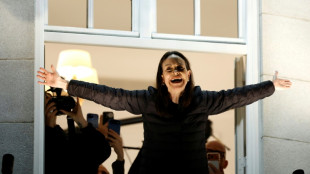 Nobel winner Machado suffered vertebra fracture leaving Venezuela
Nobel winner Machado suffered vertebra fracture leaving Venezuela
-
Stock market optimism returns after tech sell-off
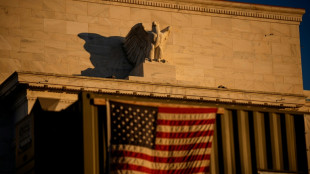
-
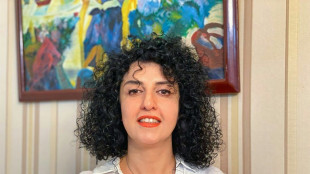 Iran Nobel winner unwell after 'violent' arrest: supporters
Iran Nobel winner unwell after 'violent' arrest: supporters
-
'Angry' Louvre workers' strike shuts out thousands of tourists
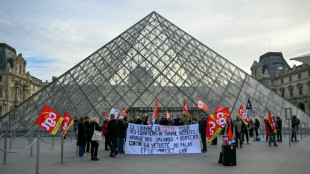
-
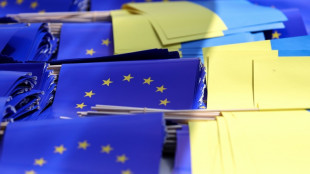 EU faces key summit on using Russian assets for Ukraine
EU faces key summit on using Russian assets for Ukraine
-
Maresca committed to Chelsea despite outburst

-
 Trapped, starving and afraid in besieged Sudan city
Trapped, starving and afraid in besieged Sudan city
-
Messi mania peaks in India's pollution-hit capital

-
 Wales captains Morgan and Lake sign for Gloucester
Wales captains Morgan and Lake sign for Gloucester
-
Serbian minister indicted over Kushner-linked hotel plan
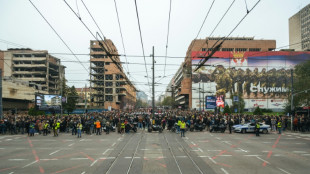
-
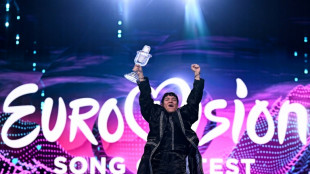 Eurovision 2026 will feature 35 countries: organisers
Eurovision 2026 will feature 35 countries: organisers
-
Cambodia says Thailand bombs province home to Angkor temples

-
 US-Ukrainian talks resume in Berlin with territorial stakes unresolved
US-Ukrainian talks resume in Berlin with territorial stakes unresolved
-
Small firms join charge to boost Europe's weapon supplies

-
 Driver behind Liverpool football parade 'horror' warned of long jail term
Driver behind Liverpool football parade 'horror' warned of long jail term
-
German shipyard, rescued by the state, gets mega deal
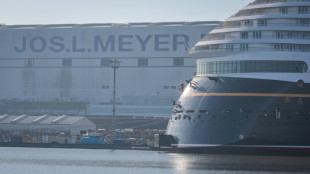
-
 Flash flood kills dozens in Morocco town
Flash flood kills dozens in Morocco town
-
'We are angry': Louvre Museum closed as workers strike

-
 Australia to toughen gun laws as it mourns deadly Bondi attack
Australia to toughen gun laws as it mourns deadly Bondi attack
-
Stocks diverge ahead of central bank calls, US data
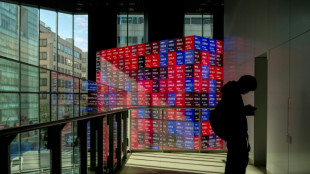
-
 Wales captain Morgan to join Gloucester
Wales captain Morgan to join Gloucester
-
UK pop star Cliff Richard reveals prostate cancer treatment
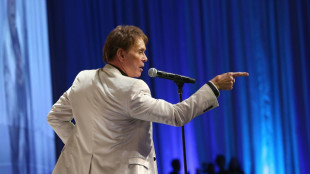
-
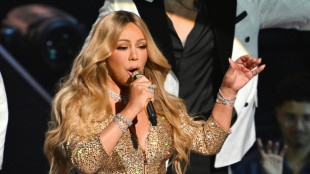 Mariah Carey to headline Winter Olympics opening ceremony
Mariah Carey to headline Winter Olympics opening ceremony
-
Indonesia to revoke 22 forestry permits after deadly floods

-
 Louvre Museum closed as workers strike
Louvre Museum closed as workers strike
-
Spain fines Airbnb 64 mn euros for posting banned properties

-
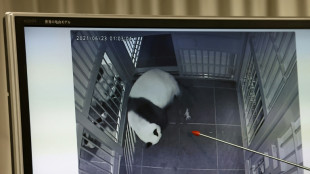 Japan's only two pandas to be sent back to China
Japan's only two pandas to be sent back to China
-
Zelensky, US envoys to push on with Ukraine talks in Berlin
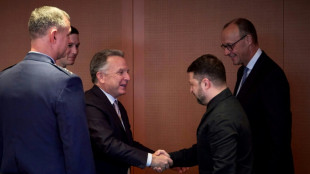
-
 Australia to toughen gun laws after deadly Bondi shootings
Australia to toughen gun laws after deadly Bondi shootings
-
Lyon poised to bounce back after surprise Brisbane omission
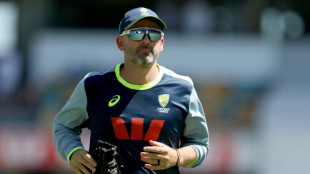
-
 Australia defends record on antisemitism after Bondi Beach attack
Australia defends record on antisemitism after Bondi Beach attack
-
US police probe deaths of director Rob Reiner, wife as 'apparent homicide'
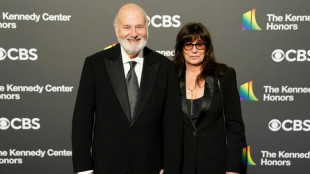
-
 'Terrified' Sydney man misidentified as Bondi shooter
'Terrified' Sydney man misidentified as Bondi shooter
-
Cambodia says Thai air strikes hit home province of heritage temples

-
 EU-Mercosur trade deal faces bumpy ride to finish line
EU-Mercosur trade deal faces bumpy ride to finish line
-
Inside the mind of Tolkien illustrator John Howe

-
 Mbeumo faces double Cameroon challenge at AFCON
Mbeumo faces double Cameroon challenge at AFCON
-
Tongue replaces Atkinson in only England change for third Ashes Test

-
 England's Brook vows to rein it in after 'shocking' Ashes shots
England's Brook vows to rein it in after 'shocking' Ashes shots
-
Bondi Beach gunmen had possible Islamic State links, says ABC

-
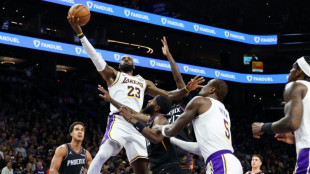 Lakers fend off Suns fightback, Hawks edge Sixers
Lakers fend off Suns fightback, Hawks edge Sixers
-
Louvre trade unions to launch rolling strike
-
 Asian markets drop with Wall St as tech fears revive
Asian markets drop with Wall St as tech fears revive
-
North Korean leader's sister sports Chinese foldable phone

-
 Iran's women bikers take the road despite legal, social obstacles
Iran's women bikers take the road despite legal, social obstacles
-
Civilians venture home after militia seizes DR Congo town
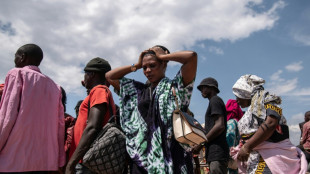
-
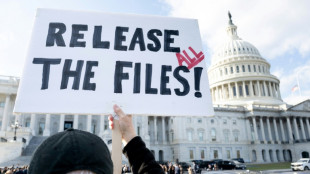 Countdown to disclosure: Epstein deadline tests US transparency
Countdown to disclosure: Epstein deadline tests US transparency
-
Desperate England looking for Ashes miracle in Adelaide
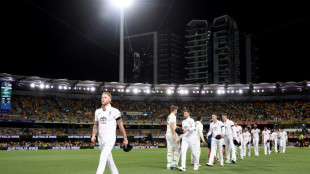
-
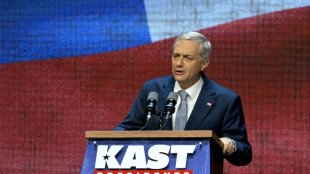 Far-right Kast wins Chile election in landslide
Far-right Kast wins Chile election in landslide
-
What we know about Australia's Bondi Beach attack
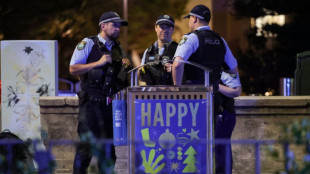
| SCS | 0.12% | 16.14 | $ | |
| BCE | 0.62% | 23.54 | $ | |
| BCC | -0.72% | 75.96 | $ | |
| NGG | 1.17% | 75.82 | $ | |
| GSK | 0.93% | 49.27 | $ | |
| RBGPF | -4.49% | 77.68 | $ | |
| RIO | -0.17% | 75.53 | $ | |
| CMSC | -0.04% | 23.29 | $ | |
| JRI | 0.06% | 13.575 | $ | |
| RYCEF | 1.48% | 14.82 | $ | |
| CMSD | 0.32% | 23.325 | $ | |
| BTI | 0.9% | 57.62 | $ | |
| AZN | 1.43% | 91.13 | $ | |
| VOD | 1.14% | 12.735 | $ | |
| RELX | 2.29% | 41.325 | $ | |
| BP | -0.03% | 35.25 | $ |

Not so SWIFT: EU energy concerns spark Russia sanctions rift
The West has agreed an onslaught of sanctions over Russia's invasion of Ukraine, but resistance from key EU nations fearful of severing their power sources has resulted in them holding off on banishing Moscow from the SWIFT banking transfer system.
Ukraine has expressly called on Western allies to expel Moscow from the system that banks rely on to transfer money.
But US President Joe Biden revealed this week that while it remains an option, "right now that's not the position that the rest of Europe wishes to take."
Former European Council President Donald Tusk lashed out at EU capitals over their failure to agree on the toughest sanctions such as cutting Russian banks off from SWIFT, exposing a rift within the bloc over its response.
"In this war, everything is real: Putin's madness and cruelty, Ukrainian victims, bombs falling on Kyiv. Only your sanctions are pretended (sic)," Tusk tweeted.
"Those EU governments, which blocked tough decisions (i.e. Germany, Hungary, Italy) have disgraced themselves."
But German Finance Minister Christian Lindner laid out starkly the preoccupation of Europe's biggest economy: suspension of SWIFT "would mean that there is a high risk that Germany will no longer receive gas, raw material supplies from Russia".
Lindner told public television he was "open" to including SWIFT "in the course of possible further toughening of sanctions" while adding that allies would "have to be aware of the consequences."
With 40 percent of gas consumed in Europe arriving from Russia, Germany's fears about the possibility of severe disruptions are well founded.
Austria, Hungary and Italy are also reluctant, pitting them against Poland, the Baltic states and non-EU member Britain.
Hungarian Prime Minister Viktor Orban alluded to his key concern -- energy prices -- as he announced sanctions agreed by the EU late Thursday.
"These sanctions do not extend to energy; so, despite the sanctions, energy supplies to Hungary and the other member states of the EU are guaranteed," he said.
- Not Iran -
Founded in 1973, the Society for Worldwide Interbank Financial Telecommunication, or SWIFT, does not actually handle any transfers of funds itself.
But the system is used by banks to send standardised messages about transfers of sums between themselves, transfers of sums for clients, and buy and sell orders for assets.
A country that is shut out of the system could still arrange for settlements of payments or transfers on a case-by-case basis.
But it would be severely crippled in its ability to trade with others, as Iran had seen when it was disconnected from the system between 2012 and 2016 over its nuclear programme.
Yet Lindner said the jury was out on whether the sanction would indeed hurt Moscow as much as it did Tehran.
"I fear that Putin has already built up an alternative to this SWIFT system," he said.
Calls for Russia to be excluded from SWIFT had already been made in 2014 when Russia annexed Crimea from Ukraine and Moscow has since sought to build up its own system.
The Russian System for Transfer of Financial Messages connects 400 Russian banks and being booted out of SWIFT could well accelerate its development.
Austrian Chancellor Karl Nehammer also cited experts' estimates that exclusion from SWIFT "won't bring the necessary success" as opposed to the EU package agreed on Thursday, which he said directly hits 70 percent of Russian banks.
For now, the option remains on the table, although French Finance Minister Bruno Le Maire has said that removing Moscow from SWIFT is a "last resort".
Asked what kind of further aggression must come from Russia against Ukraine before the EU would cut it off from SWIFT, German Chancellor Olaf Scholz's spokesman suggested that not including it in Thursday's package partly came down to the question of the expediency of implementation.
Such a move would be "technically complex to prepare" and have "severe consequences on the transactions traffic in Germany and for German companies doing business with Russia, but also for energy delivery payments, and all that must be well prepared," said Steffen Hebestreit.
Meanwhile the Baltic countries, which directly border Russia, said they had not given up hope on the adoption of the measure.
"We will try and try again to persuade our partners to switch Russia off from SWIFT... if not in this sanctions package, maybe in the next one. We don't have to wait until there are gunfights in the streets of Kyiv and dead bodies lying around," Latvian Foreign Minister Edgars Rinkevics told reporters Friday.
A.Santos--PC
